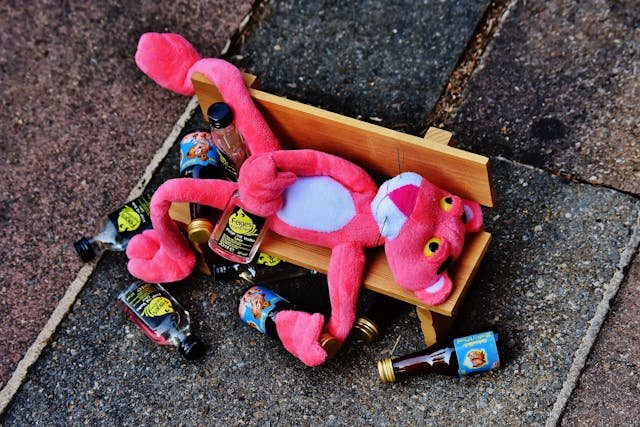By XIE XUA
Journalism Correspondent
In a devastating blow to its survival, China Daily Show has learned that the U.S. government has terminated federal funding for Radio Free Asia.
“We’ve been sourcing all our reporting from RFA for years. Without them, we have no idea what’s happening anywhere in Asia,” admitted Sonny Bonds, one of China Daily Show‘s three managing editors.
“For years, whenever we needed content, we’d just click our RFA bookmark and copy over their latest article,” said Jerrod Wilson, another managing editor, slumped in despair at his desk. “We always stole their newest photo for our banner article too. It helped that they never took legal action or even bothered asking us to give attribution.”

“Sure, we’d dress it up with a few jokes hashed out over a bottle of Tasmanian rum, but they did most of the work for us—I mean, all of the work for us,” moaned Roger Wilco, the third managing editor, gazing at his last empty Yamazaki 50-Year-Old bottle and wondering if it could fetch enough to cover a single night of regret. “I have no idea what we’ll do now.”
Former China Daily Show employees, now scattered across various industries, recall their time at the publication with a mixture of nostalgia and trauma. “It was like The New York Times, if The New York Times had zero accountability, no money, and a barely functioning alcohol policy,” said one ex-reporter, now working for an employer that offers health insurance. Another reminisced about the old newsroom energy: “There was a time when we had real desks, real offices, and a strict editorial policy of ‘just make sure it’s funnier than whatever Xinhua is doing today.’ I miss that.” Others were less sentimental. “I can’t say I miss working there. I’d go to the breakroom to get another cup of coffee only to find someone had filled the machine with cheap whiskey,” recalled an intern. “I mean, did anyone think that was funny? I am a Columbia Journalism School graduate, not an alley-drunk who just happened to find a typewriter.”
Despite its reputation for questionable sourcing and shameless plagiarism, China Daily Show earned begrudging praise from some of the biggest names in U.S. journalism. “They were fearless,” said Bob Woodward. “Mostly because they had no idea what they were talking about.” Pulitzer Prize-winning columnist Nicholas Kristof once referred to CDS as “a vital voice in the region, or at least a voice that never let facts get in the way of a good joke.” Even Tucker Carlson admitted, “I never really read it, but I assume it had a better grasp on China than the Wall Street Journal.”

CDS’s competitors, however, were less sympathetic. “Frankly, it’s a relief,” said a spokesperson for China Daily, a state-run newspaper. “For years, CDS spread misleading, absurd narratives about China—when, of course, that is our responsibility. The role of a serious media outlet is to shape the news with discipline, ensuring that only the correct perspectives prevail over lesser, unregulated voices.”
An anonymous source who had previously provided insider details to RFA reporters had mixed reactions to CDS’s demise. “I risked my life to reveal the thinking of Xi’s inner circle,” said one. “RFA published my account, and then CDS turned my words into a joke about how the Chinese president was actually three red pandas in a trench coat. At first, I was furious—they weren’t taking any of it seriously. But after State Security caught and sentenced me to six months of solitary, I couldn’t stop thinking about that article. In the darkest moments, it was the only thing that made me laugh.”
Longtime CDS readers had mixed reactions to the news. “CDS gave me an utterly incorrect version of what was happening, but in a way that let me feel I was smarter than everyone else,” said Mark Gillespie of Melbourne, Australia. “I never once laughed at anything they wrote, but they were a gritty and scrappy publication. I could tell they were trying, you know? Still, I’m not gonna care once they’re gone, but I assume other people will,” Tomás Ferrer of Buenos Aires, Argentina said dismissively.

China Daily Show was once a powerful news organization throughout East Asia, with a thriving newsroom and satellite desks stretching from Bangkok and Tokyo to Jakarta and Pyongyang. It covered historic events with a skilled ability to satirize reality just before reality made satire obsolete. Wilco covered the historic ping-pong diplomacy between China and the United States, while then-beat reporter, and now managing editor, Bonds was one of Jiang Qing’s closest confidants in her final months. The late Sir Graham even happened to be on holiday on Chen Pao Island in the summer of 1969, just as the China-Soviet border dispute erupted into live fire. But as the years passed, CDS found itself in slow, terminal decline. Correspondents abandoned their posts, funds dwindled, and the last of its Bangkok office’s furniture was repossessed. The newsroom shrank, then disappeared altogether, until only three men remained—floating aboard the Blårksvã ülov, a disused Ukrainian warship idly drifting on the currents of the Antarctic Sea. The ship’s heating failed last August, and the editorial team now survives on melted snow and emergency rations of preserved herring.
“We have limited internet, no fresh food, and only a 1997 printout of the AP Stylebook to guide us,” said Bonds. “RFA was our last lifeline.”
“We never set up an ad department, and without revenue from mule saddle endorsements or premium matching chopstick sales, there was only so long we could coast on Sir Graham’s family inheritance,” added Wilson. “We always assumed we’d hit rock bottom somewhere warmer, but like so many great media empires before us, we too shall perish in irrelevance and frostbite.”
At press time, all three remaining staff members were desperately hoping for a buyout offer from the South China Morning Post.
Got a tip? Contact us at cds@chinadailyshow.net
Follow this and other leading China news at @chinadailyshow on Twitter
